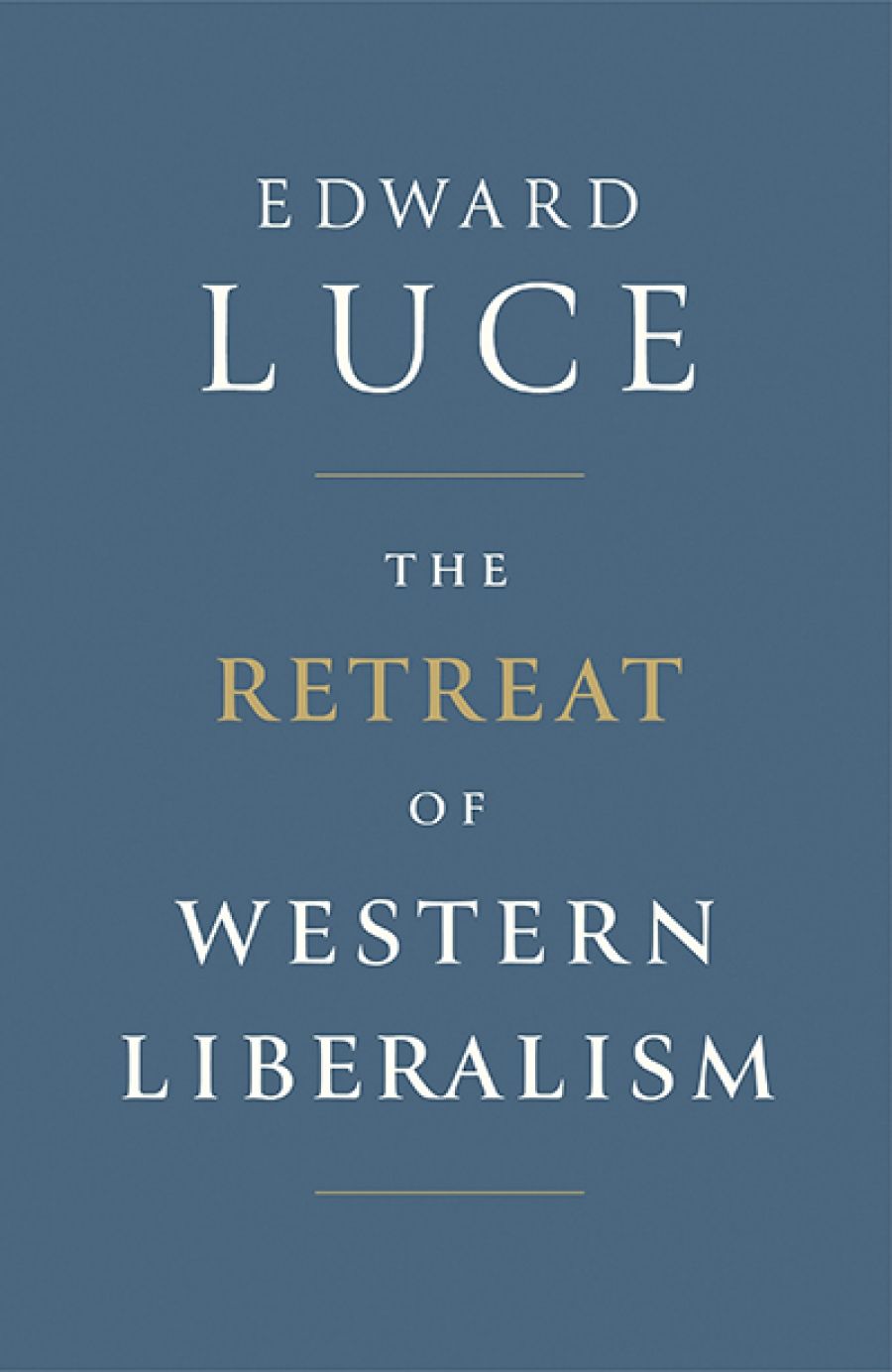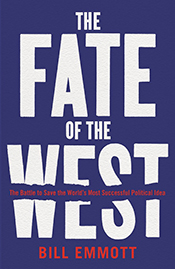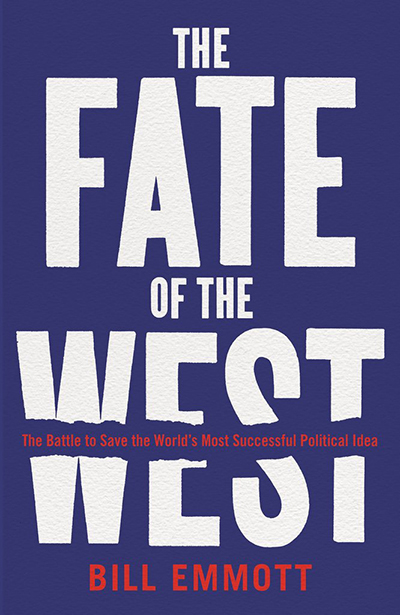
- Free Article: No
- Contents Category: Politics
- Custom Article Title: Mark Chou reviews 'The Retreat of Western Liberalism' by Edward Luce and 'The Fate of the West: The battle to save the world’s most successful political idea' by Bill Emmott
- Custom Highlight Text:
Anyone who has paid any attention to the words coming out of the mouths of populist figureheads like Donald Trump, Nigel Farage, Marine Le Pen, and Geert Wilders will know this: populists traffic in nostalgia. For them, the best days are always our yesterdays – before the West was corrupted by the onslaught of progressive ...
- Book 1 Title: The Retreat of Western Liberalism
- Book 1 Biblio: Little, Brown, $32.99 pb, 234 pp, 9781408710401
- Book 2 Title: The Fate of the West:
- Book 2 Subtitle: The battle to save the world’s most successful political idea
- Book 2 Biblio: The Economist Books (Profile Books), $32.99 pb, 267 pp, 9781781257791
- Book 2 Cover Small (400 x 600):

- Book 2 Cover (800 x 1200):

- Book 2 Cover Path (no longer required): images/ABR_Online_2017/November_2017/The%20Fate%20of%20the%20WestABROnline.jpg
In 2017, with Trump firmly installed in the White House and Brexit negotiations underway, nostalgia has lost none of its political allure. But what has been surprising is how it has come to define not only the populist agenda but increasingly our response to it as well. Nostalgia is now the lingua franca of both populists and their progressive opponents. Of course, it would be naïve to think that only anti-establishment political forces profit from resurrecting a bygone era. As many have noted, both Bernie Sanders and Jeremy Corbyn based their visions for the future on policies from the past; even Hillary Clinton’s 2016 slogan ‘Stronger Together’, it has been said, sentimentalised an American solidarity sadly out of step with the polarised present. Yuval Levin, author of The Fractured Republic (2016), thus believes that both the left and right look back to an idealised past when the going gets tough. The only difference between them is when and what that idealised past was.
Edward Luce and Bill Emmott, two commentators best known for their journalistic work with the Financial Times and The Economist, are no strangers to the past. Their books, which include Luce’s Time to Start Thinking: America in the age of descent (2012) and Emmott’s 20:21 Vision: Twentieth-century lessons for the twenty-first century (2003), have a habit of documenting how a society’s past casts a shadow over its future. Their latest contributions tread the same terrain. This time, they take aim at the West and how its past practices contributed to the populist cultural backlash of 2016. But what marks out these books more than the at times scathing historical introspection is their palpable longing for a vision of the West as it once was: liberal, democratic, equal, open, rules-based, outward-looking – in other words , everything that stands opposed to the current populist offensive. By doing so, it is clear that Luce and Emmott have each written books which, for want of a better term, might be classified as anti-populist nostalgia literature.
Ostensibly, Luce’s The Retreat of Western Liberalism sounds the alarm bells. ‘Western liberal democracy is not yet dead,’ he writes, ‘but it is far closer to collapse than we may wish to believe.’ Not since World War II has the idea of liberal democracy confronted the challenges it sees today. Internationally, as Luce documents, the rise of non-democratic powers like China during a decade of Western economic turmoil caps off a startling realisation: there are twenty-five fewer democracies today than at the turn of the century. The United States, Western liberal democracy’s standard-bearer, hardly helped matters during these years. Although no one could begrudge US vengeance for what happened on 9/11, Luce believes that by taking the ‘war on terror’ to citizens at home via the Patriot Act and to Iraq, which culminated in nothing except a failed attempt to promote democracy abroad, 9/11 ended up dealing a ‘twin blow to Western democracy’s allure’.
Domestically, Luce draws readers’ attention to the spectre of stagnation that has set in within many Western societies. Citing Ronald Reagan, who once said that ‘Progress is our most important product’, Luce makes the point that when society grows, people invest in the future. There is faith in institutions and in one another. But when society stagnates, people lose hope and begin going backward. That, he argues, is what has happened in contemporary America. Plagued by economic decline, growing competition for jobs, the onset of automation, America’s opioid epidemic, and rising inequality, it is little wonder that those ‘left-behind’ have become nostalgic for a dimly recalled past when progress, at least for people like them, was not just possible, but also a birthright.
 A protest against Donald Trump in Minneapolis, Minnesota on inauguration day, January 20, 2017 (photograph by Fibonacci Blue, Wikimedia Commons)
A protest against Donald Trump in Minneapolis, Minnesota on inauguration day, January 20, 2017 (photograph by Fibonacci Blue, Wikimedia Commons)
Like Luce, Emmott’s The Fate of the West warns us that ‘We are living in a time when openness is under challenge, when equality of rights and treatment is in greater doubt than for many decades, and when social trust is looking frayed.’ The two ‘lodestars’ of openness and equality that the West first authored and that have since made the West what it is are both experiencing extreme strain. They are being attacked from within, by people and forces that have reaped the benefits of the West’s openness and equality to now push ‘distinctly unWestern ideas’.
The chief culprit, Emmott argues, is Donald Trump. For Emmott, the US president’s three main policy solutions – withdraw from free trade agreements, jettison security alliances, and tighten immigration – all threaten the West’s core ideals. They are a menace that will replace the West’s openness of trade with ‘a system of commerce based on threats and brute power’. They will undermine how nations, especially ‘liberal, open, friendly nations’, interact with one another. Finally, they will force longstanding allies to seek new alliances with non-Western nations, ‘breaking a basic assumption that liberal nations are more dependable and trustworthy for each other’.
So what happens now? Again, Emmott shares Luce’s view: External threats from Islamic State, China, and Russia may be considerable, but they pale in comparison to the threats produced by the West itself. First and foremost, Emmott believes, the West has to confront its single greatest threat: inequality. For him, it is inequality that makes people feel left behind and ‘willing to support radical forces that would throw away openness purportedly to restore their sense of equality or shore up their sense of identity’.
Neither Luce nor Emmott can therefore be accused of being uncritical of current and past Western practices; both believe that the West’s greatest risks emanate from within. But they also believe that the West has what it takes to rescue itself from its current malaise, though Emmott is the more optimistic of the two on this front.
We must begin by reviving both lodestars, not one over the other, Emmott argues. Only when that happens will the Western project as a whole be revived. Luce offers more specifics, which include recognising the West’s collective ‘ignorance of our history, indifference to society’s losers and complacency about the strength of our democracies’. That aside, Luce believes that the West must do more to reverse its current trajectory, which has recently seen many liberal democracies switch from ‘John Locke’s social contract to the bleaker Leviathan of Thomas Hobbes’. What it must not do, Luce warns, is to continue ‘looking backwards to a golden age that can never be regained’.
But that, it turns out, is what he and Emmott end up doing anyway, albeit in different ways. The pit stop that both books make at Francis Fukuyama’s The End of History and the Last Man (1992) helps illustrate where they diverge. For Emmott, as for Fukuyama when the Berlin Wall fell, liberal democracy is the endpoint of human evolution and the final form of government. Nothing that has come along since comes close to rivalling the jewel in the West’s crown. Which is his way of saying: to move forward, the West must actually move backward to the end of history. This is not just desirable, it is possible. Luce, on the other hand, is more reticent. From Moscow’s or Beijing’s or Ankara’s standpoint, he writes, ‘history is back and nothing is inevitable, least of all liberal democracy’. But it is the twofold tragedy woven into Luce’s book that, knowing ‘the search for Eden always ends in tears’, he searches for it nonetheless.


Comments powered by CComment